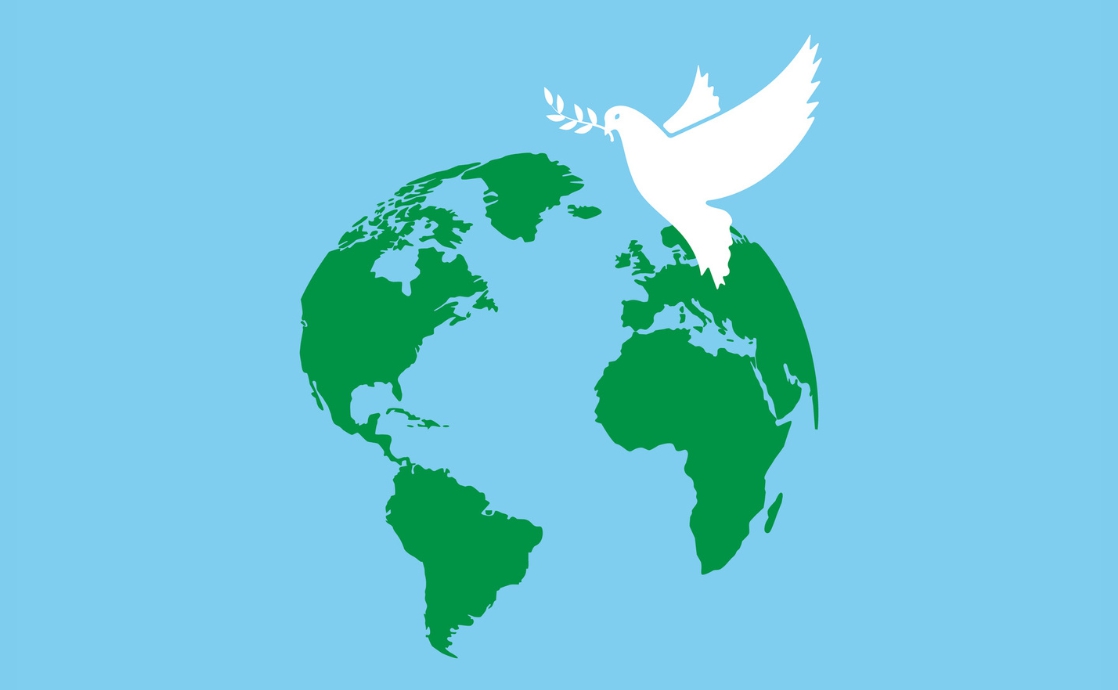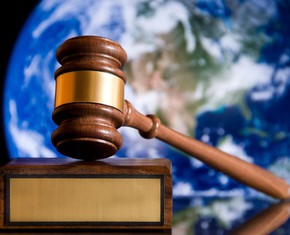The views expressed in our content reflect individual perspectives and do not represent the authoritative views of the Baha'i Faith.
Baha’is firmly believe that humanity is progressing toward the establishment of a global peace based on justice, equality and love, brought about by the teachings of Baha’u’llah, the founder of the Baha’i Faith.
The Baha’i writings make that fateful promise of a peaceful world. This is just one example from Abdu’l-Baha, son of Baha’u’llah and one of the central figures of the Baha’i Faith, excerpted from a speech he gave in London in 1911:
The gift of God to this enlightened age is the knowledge of the oneness of mankind and of the fundamental oneness of religion. War shall cease between nations, and by the will of God the Most Great Peace shall come; the world will be seen as a new world, and all men will live as brothers.
Clearly, we have a long way to go – humanity has not yet achieved the peace promised by Baha’u’llah. War has again broken out in Europe with all the destruction and misery of people being uprooted from their homes, and the death of thousands of civilians and soldiers. In other parts of the world we also see examples of the cruel results from local and national conflicts.
RELATED: Peace: the Greatest War Memorial
When Will Peace Proliferate?
So, when will this “Most Great Peace” come, and what will it take to bring it to reality?
The Baha’i writings make it clear that humankind needs to go through a series of steps that lead toward this all-important goal. Unfortunately, so far it seems that humanity can only make progress toward peace through the lessons we learn and the suffering that accompanies them.
In his writings, Baha’u’llah summarized one of the first and most critical steps toward global disarmament and an end to active hostilities – the establishment of what he termed the “Lesser Peace”:
We pray God – exalted be His glory – and cherish the hope that He may graciously assist the manifestations of affluence and power and the daysprings of sovereignty and glory, the kings of the earth – may God aid them through His strengthening grace – to establish the Lesser Peace. This, indeed, is the greatest means for insuring the tranquility of the nations. It is incumbent upon the Sovereigns of the world … unitedly to hold fast unto this Peace, which is the chief instrument for the protection of all mankind. It is Our hope that they will arise to achieve what will be conducive to the well-being of man. It is their duty to convene an all-inclusive assembly, which either they themselves or their ministers will attend, and to enforce whatever measures are required to establish unity and concord amongst men. They must put away the weapons of war, and turn to the instruments of universal reconstruction. Should one king rise up against another, all the other kings must arise to deter him. Arms and armaments will, then, be no more needed beyond that which is necessary to ensure the internal security of their respective countries. If they attain unto this all-surpassing blessing, the people of each nation will pursue, with tranquility and contentment, their own occupations, and the groanings and lamentations of most men would be silenced.
You can read more about the characteristics of the Lesser Peace here. Baha’is consider that lesser peace a primarily political one, in which the world’s leaders finally conclude that war must be stopped.
At the time when Baha’u’llah urged the leaders of the world to come together to construct a system of global mutual security, the idea seemed unthinkable. No international organizations and no system of worldwide communications existed, and the vast majority of the world’s people remained unaware of events in places other than their immediate surroundings.
The League of Nations and What It Meant
After the terrible slaughter and tragedy of World War I, however, a series of events took place which resulted in the formation of the League of Nations. In 1920 the League formed with 48 member nations (not including the U. S., which Congress voted not to join). The organization did some positive things, but it disbanded with the onset of WW II, without achieving its goal of avoiding conflict. Although viewed by many as a failure, from a Baha’i perspective it marked a truly significant development. Shoghi Effendi, the Guardian of the Baha’i Faith at that time, wrote that the creation of the League of Nations represented a critical step in the right direction for humanity, which the Baha’i teachings “acclaimed as signalizing the dawn of the Most Great Peace …”
The UN: After the Largest War, Another Attempt at Peace
The next step in the process of creating world order, the establishment of the United Nations, occurred in June of 1945, just one month after the official end of the second World War. This historic step toward a peaceful world took place after the most horrific global conflict the world has ever experienced, including the first use of nuclear weapons. The United Nations, an organization much more effective and longer-lasting than the League of Nations, now has more member states (193 – almost all of the world’s countries), a stronger organization with a headquarters in New York City, and a much broader scope of activities throughout the world. This statement of the UN’s mission clearly reflects many of the major principles of the Baha’i Faith:
The UN was created for the maintenance of international peace and security, development of friendly relations among nations, achievement of international cooperation in solving international problems of economic, social or humanitarian character and the promotion and encouragement of respect for human rights and fundamental freedoms for all without distinction of race, sex, language or religion.
It is beyond the scope of this essay to describe the many activities of the UN and the excellent work the organization has accomplished in the area of human rights, limited conflict avoidance, environment, economic development, education, and other important areas of human endeavor. It is, however, safe to infer that the UN has not been successful in establishing a mutual security agreement or the peace among nations envisioned by Baha’u’llah.
RELATED: The Majestic Birth of a United Humanity
What an International Order Needs to Succeed
In recent history, the world has witnessed numerous examples of UN member nations who, although signatories to the UN charter, have violated that very charter and initiated war by invading other countries. The ongoing war in Ukraine is only the latest example of such aggression.
Unfortunately, the UN lacks the authority to do what NATO has done: formalize a policy of mutual cooperation and security, where if a nation attacks any member, all the NATO nations will together stop that aggression. Kofi Annan, a respected former Secretary-General of the United Nations, has said that the UN is an organization that has principle, but no power. Clearly, in its present form, the UN cannot enforce an international mutual security agreement.
The question then arises: what are the next steps for a global pact that will bring about the Lesser Peace? Will the UN evolve into a more effective organization to ensure peace, or will a new organization be needed? Will this latest European war expand into a worldwide tragedy that humanity must go through once again in order to realize that the scourge of conflict must be forever banned? No one knows the answer to these questions – but more than a century ago, Baha’u’llah wrote this highly significant prediction:
The world is in travail, and its agitation waxeth day by day. Its face is turned towards waywardness and unbelief. Such shall be its plight, that to disclose it now would not be meet and seemly. Its perversity will long continue. And when the appointed hour is come, there shall suddenly appear that which shall cause the limbs of mankind to quake. Then, and only then, will the Divine Standard be unfurled, and the Nightingale of Paradise warble its melody.
It may appear from this passage that humanity has not yet reached the point where its leaders are ready to implement an effective international security agreement. Looking back historically, will more suffering on an even larger scale need to happen before our leaders decide to take that necessary step?
In a related passage, Abdu’l-Baha spoke about the motivating force that will create a permanently peaceful world:
Today the world of humanity is in need of international unity and conciliation. To establish these great fundamental principles a propelling power is needed. It is self-evident that the unity of the human world and the Most Great Peace cannot be accomplished through material means. They cannot be established through political power, for the political interests of nations are various and the policies of peoples are divergent and conflicting. They cannot be founded through racial or patriotic power, for these are human powers, selfish and weak. The very nature of racial differences and patriotic prejudices prevents the realization of this unity and agreement. Therefore, it is evidenced that the promotion of the oneness of the kingdom of humanity, which is the essence of the teachings of all the Manifestations of God, is impossible except through the divine power and breaths of the Holy Spirit. Other powers are too weak and are incapable of accomplishing this.
Humanity has gained the crucial advancements we’ve made toward banishing war forever through untold suffering. It seems, in the near-term, that humanity will continue to face many more difficulties. Baha’is around the world hope that will not be necessary, and that humankind will heed Baha’u’llah’s message and turn toward peace without having to experience more tragedy and death. Thankfully, however, we have the promises of Baha’u’llah of a bright future where peace and security wait for all of us.
















Comments
Sign in or create an account
Continue with Googleor